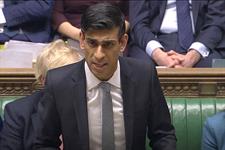Charities have criticised a lack of sector-specific policies in today’s Budget, amid policy announcements by the Chancellor of the Exchequer on the coronavirus, business rates and the Tampon Tax.
Rishi Sunak, who was presenting his first Budget, set out a large number of spending commitments, including £30bn to help businesses and the NHS through the Covid-19 outbreak, which has infected hundreds of people in the UK and about 120,000 worldwide.
Among the immediate measures to help staff and employers through the ongoing Covid-19 crisis was an announcement that statutory sick pay would be refunded to organisations covering the two weeks anyone diagnosed with Covid-19 will need to self-isolate.
Statutory sick pay would be available to all employees from day one of the illness, instead of the fourth day, the Chancellor said, and would apply even if symptoms were not present but the employee was advised to self-isolate.
A temporary Coronavirus Business Interruption Loan Scheme will be introduced, Sunak said, with loans of up to £1.2m to support small and medium-sized businesses and a government guarantee of up to 80 per cent of losses with no fees.
It is not yet known if charities will be allowed to apply.
A business rates retail discount would be extended to museums, art galleries and theatres, among a range of other organisations, the Chancellor announced, meaning that for the next year only, these organisations would pay no business rates.
A review of business rates would report by the autumn, the Chancellor said, and would publish a call for evidence this spring.
The Tampon Tax, which refers to VAT paid on women’s sanitary products, would be abolished in January 2021, the Chancellor announced.
Tens of millions of pounds of tax funds raised through this measure have been passed to women’s charities in recent years through the Tampon Tax Fund.
VAT will be removed before Christmas from digital books and other publications, which should also benefit charities.
The Armed Forces Covenant Fund Trust will get £10m in 2020/21 to deliver charitable projects and initiatives that support veterans with mental health needs.
Projects to help rough sleepers will also get £650m.
A Comprehensive Spending Review and an autumn Budget will both be held later this year.
A spokesman for the National Council for Voluntary Organisations said the business rates review was welcome, but it was important that “any potential system does not leave charities any worse off”.
He said that, although the end of the Tampon Tax was great news, it was unclear how the funding for women’s charities through the Tampon Tax Fund would be replaced.
The spokesman also noted there was no specific exclusion of charities from Covid-19 emergency funding.
Third Sector has asked the Treasury to confirm whether charities will be eligible.
John Hemming, chair of the Charity Tax Group, said: “Overall, the lack of references to charities in the Budget is disappointing. Funding for veterans projects and cultural projects are welcome, but do not address the wider funding uncertainty that charities currently face at a time when they are being asked to do more.
“Measures have been introduced to support business and individuals, but the government can do more to support charities as key supporters of wider society.”
Hemming did, however, welcome the decision to introduce a VAT zero rate on digital publications, an issue the CTG has campaigned on for a number of years. He called on the government to review “the obstacles charities face in the VAT system”.
Vidhya Alakeson, chief executive of the community business charity Power to Change, said there was not enough in the Budget.
“This budget simply did not go far enough in helping the organisations we work with respond to Covid-19.
“We would like to see the same principle for business rate relief extended to those eligible for charitable rate relief.
“We eagerly await confirmation that community businesses, charities, social enterprises and other social organisations have access to the new Business Interruption Loans, and to tax deferments or temporary waivers – for example, for VAT.”
Sir John Low, chief executive of the Charities Aid Foundation, said: “Just as business will need support, charities too expect to struggle if the virus affects the economy, and we are already seeing the impact of coronavirus through issues such as the cancellation of fundraising events.
“We urge the government to confirm that the announcements to help businesses weather the storm will be extended to include charities across the UK. We hope the government will support their crucial role.”
Caron Bradshaw, chief executive of the Charity Finance Group, said: “The measures deal with the visible tips of icebergs, such as the homelessness provisions, without digging deep enough into the underlying issues.
“The budget might have been heralded as ‘getting it done’, but we need government to ‘get’ the sector and understand the role it plays in a thriving post-Brexit society.”
